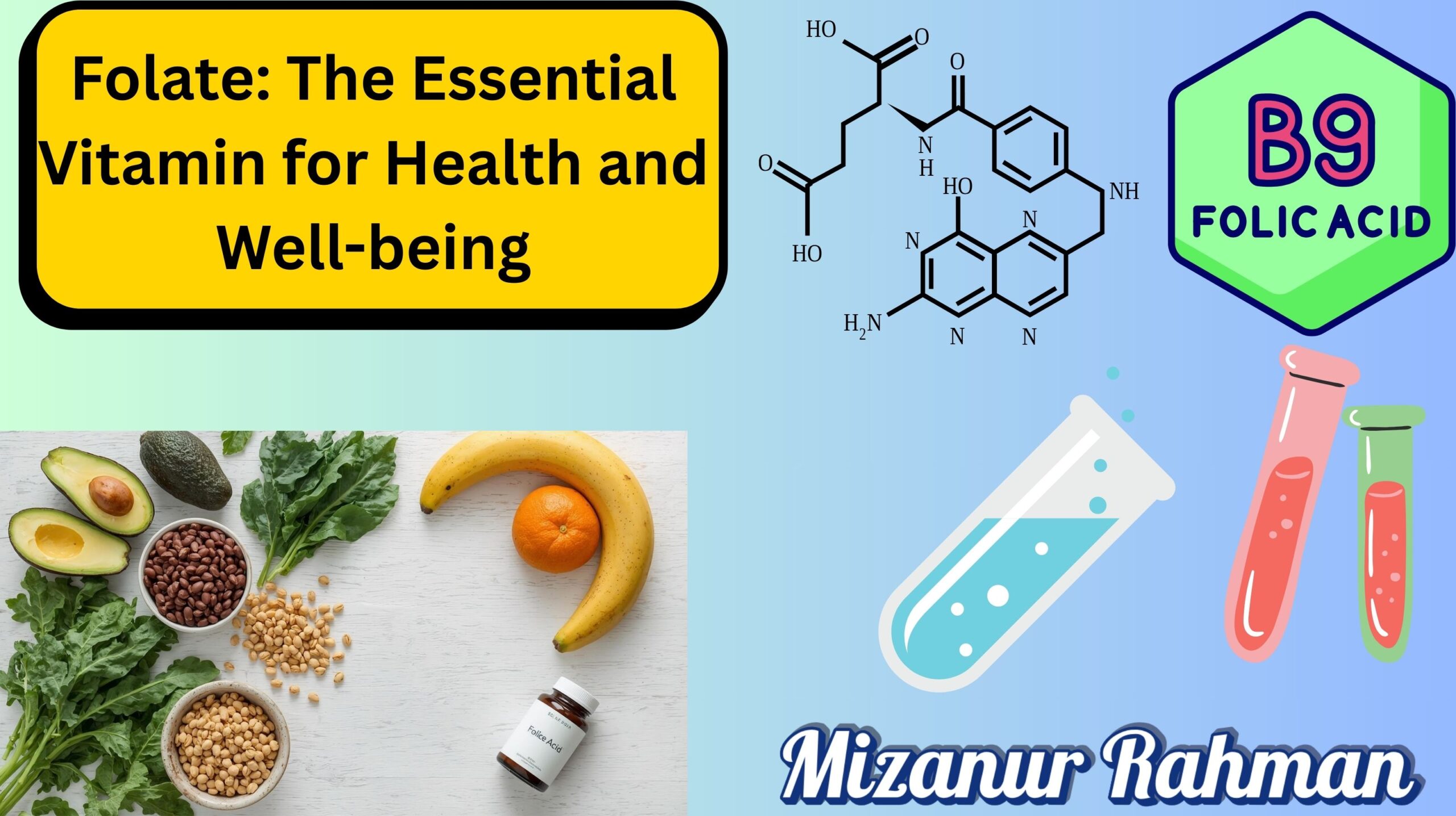
Folate, also known as vitamin B9, is one of the most important water-soluble vitamins that plays a central role in human health. Despite being required in small amounts, folate contributes to a wide range of biochemical processes that keep our bodies functioning properly. From supporting cell growth and DNA synthesis to aiding in the prevention of certain birth defects, folate is a nutrient that deserves careful attention in both diet and healthcare.
What is Folate?
Folate refers to a group of naturally occurring compounds belonging to the vitamin B family. It is found in leafy greens, legumes, citrus fruits, and fortified foods. The synthetic form, known as folic acid, is widely used in supplements and food fortification programs because it is more stable and bioavailable than natural folate.
Once consumed, folate is metabolized into its active form, tetrahydrofolate (THF), which participates in one-carbon metabolism — a critical pathway responsible for DNA and RNA synthesis, amino acid metabolism, and methylation reactions.
Key Functions of Folate in the Body
Folate is not just a single-purpose nutrient; it is involved in many biochemical processes:
- DNA and RNA Synthesis
Folate provides essential building blocks for nucleic acids, which are required for the formation of new cells. Without folate, DNA replication and repair would be impaired. - Red Blood Cell Formation
Adequate folate prevents megaloblastic anemia, a condition where red blood cells become abnormally large and inefficient in carrying oxygen. - Amino Acid Metabolism
Folate helps in the conversion of homocysteine to methionine, a reaction that requires both folate and vitamin B12. High levels of homocysteine are linked with cardiovascular risk, making folate important for heart health. - Methylation Reactions
Folate-dependent methylation influences gene expression, neurotransmitter production, and detoxification processes. - Pregnancy and Fetal Development
Folate is crucial during pregnancy, as it prevents neural tube defects (NTDs) such as spina bifida and anencephaly. It also supports the rapid growth of maternal and fetal tissues.
Dietary Sources of Folate
A variety of foods naturally provide folate. Including them regularly ensures adequate intake without always relying on supplements.
- Leafy green vegetables – Spinach, kale, collard greens, and lettuce
- Legumes – Lentils, chickpeas, beans, and peas
- Fruits – Oranges, papaya, bananas, and avocados
- Whole grains – Brown rice, whole wheat, and fortified cereals
- Animal products – Liver and eggs contain small amounts
- Nuts and seeds – Sunflower seeds, peanuts, and almonds
Cooking may reduce folate content, so consuming raw or lightly cooked vegetables is advisable.
Folate vs. Folic Acid
Although folate and folic acid are often used interchangeably, they are not identical.
- Folate is the naturally occurring form found in food.
- Folic acid is the synthetic version used in supplements and fortified foods.
The body converts both forms into biologically active folate, but folic acid has higher stability and absorption. However, unmetabolized folic acid in the blood may have unclear health implications if consumed excessively.
Recommended Daily Intake
The recommended dietary allowance (RDA) for folate varies by age and physiological condition:
- Adults: 400 mcg DFE (Dietary Folate Equivalents)
- Pregnant women: 600 mcg DFE
- Lactating women: 500 mcg DFE
- Children: 150–300 mcg DFE depending on age
These values highlight the increased demand during pregnancy and breastfeeding.
Folate Deficiency: Causes and Consequences
Despite being widely available in foods, folate deficiency is not uncommon, especially in populations with limited dietary diversity.
Causes of deficiency include:
- Poor dietary intake
- Chronic alcoholism
- Malabsorption syndromes (e.g., celiac disease)
- Use of certain medications (methotrexate, phenytoin, trimethoprim)
- Increased demand during pregnancy
Clinical signs and symptoms of deficiency include:
- Megaloblastic anemia (fatigue, pallor, weakness)
- Elevated homocysteine levels
- Irritability, depression, and cognitive difficulties
- Birth defects in infants of folate-deficient mothers
Health Benefits of Folate
Beyond preventing deficiency, folate has several additional health benefits supported by research:
- Prevention of Neural Tube Defects
One of the strongest public health achievements has been the use of folic acid supplements to reduce neural tube defects in newborns. Supplementation before conception and during early pregnancy lowers the risk significantly. - Cardiovascular Protection
By regulating homocysteine levels, folate helps reduce the risk of heart disease and stroke. - Cognitive Health
Adequate folate may protect against age-related cognitive decline and dementia, although findings are mixed. - Cancer Prevention
Folate plays a dual role. Adequate intake protects against DNA damage, but excessive supplementation might promote tumor growth in individuals with pre-existing cancers. Therefore, balance is key. - Mental Health Support
Folate contributes to the synthesis of neurotransmitters such as serotonin and dopamine, which influence mood regulation. Low folate status has been linked with depression.
Folate Supplementation: Who Needs It Most?
While a balanced diet covers folate requirements for most people, some groups benefit from supplements:
- Women planning pregnancy – Advised to take 400 mcg folic acid daily at least one month before conception.
- Pregnant women – Need higher intake due to increased fetal demands.
- People with malabsorption disorders – May require supplementation under medical supervision.
- Individuals on certain medications – Anti-epileptics and chemotherapy drugs interfere with folate metabolism.
Practical Tips for Maintaining Adequate Folate Levels
- Eat a daily serving of leafy greens.
- Combine legumes with whole grains for plant-based folate.
- Include vitamin C-rich foods (like oranges) to enhance folate absorption.
- Choose fortified bread, rice, or cereals if natural intake is low.
- Pregnant women should not rely on food alone—supplements are necessary.
Final Thoughts
Folate is a small nutrient with a big impact. It ensures healthy cell division, protects the cardiovascular system, supports mental health, and safeguards future generations by preventing birth defects. Deficiency can have serious consequences, but fortunately, it is preventable through a well-balanced diet and appropriate supplementation.
In today’s world, where processed food consumption is high, being mindful of folate-rich choices can make a lasting difference in long-term health. Whether you are planning a pregnancy, managing chronic illness, or simply aiming for better well-being, ensuring adequate folate intake is a vital step in your nutrition journey.
